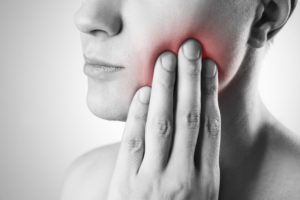 Is eating your favorite ice cream after a long day more difficult these days? What about a glass of iced water? Does the thought of drinking soup or coffee make you cringe as the hot liquid makes contact with your teeth? If these scenarios sound familiar, you may want to schedule an appointment with an emergency dentist. Sensitive teeth are not typical and could be a sign that an emergency is just around the corner.
Is eating your favorite ice cream after a long day more difficult these days? What about a glass of iced water? Does the thought of drinking soup or coffee make you cringe as the hot liquid makes contact with your teeth? If these scenarios sound familiar, you may want to schedule an appointment with an emergency dentist. Sensitive teeth are not typical and could be a sign that an emergency is just around the corner.
To learn what tooth sensitivity is and what to do next, keep reading!
Why Do Teeth Feel Sensitive?
Teeth are made up of hard enamel, which is meant to protect the other layers in your teeth as it becomes exposed to food and beverages you consume throughout the day. While enamel is the hardest substance in the body, it doesn’t mean it can prevent all external elements from reaching your teeth’s nerve endings located in the pulp.
However, these nerve endings also exist in dentin, the layer sitting right behind enamel. This layer is much thinner and more sensitive to the elements. If enamel has worn down far enough, it can begin to expose the dentin and cause tooth sensitivity when exposed to hot, cold, acidic or very sweet food and beverages.
Once enamel has worn away, it’s gone for good. Therefore, it’s essential that you determine the source of the problem before a dental emergency occurs.
How Did My Teeth Become Sensitive?
There are many ways tooth sensitivity can happen, but the most common way it occurs is through enamel erosion. Whether you’re eating and drinking substances that rapidly erode enamel, brushing your teeth with too much force, using a toothbrush that’s too abrasive, or your gums are receding due to gum disease, preventing future damage is key to reducing sensitivity. Enamel can also erode if you have an undiagnosed grinding problem that’s wearing it down while you sleep.
Start by taking a close look at your current diet and oral care routine. Avoid foods that are particularly sweet or acidic to prevent erosion. Switch your toothbrush out for a soft-bristled and make sure to brush no longer than two minutes at a time.
What Should I Do Now?
If enamel has eroded too far, it can make your teeth far more susceptible to decay. If your gums are receding, it exposes the root and leaves your inner tooth more vulnerable to infection. If you’re grinding your teeth or using your teeth to open packages or bottles, a tooth can easily crack and expose the pulp to oral bacteria. All of these events can precipitate a dental emergency.
Don’t let tooth sensitivity turn into something much more harmful and expensive. Schedule an appointment today to prevent the worst-case scenario!
About the Author
Dr. Raj Vekariya earned his dental degree from New York University’s College of Dentistry. Since then, he’s helped people treat a wide variety of dental emergencies, including broken teeth, dental sensitivity and many other cases. To learn more about his practice, you can contact him through his website.
